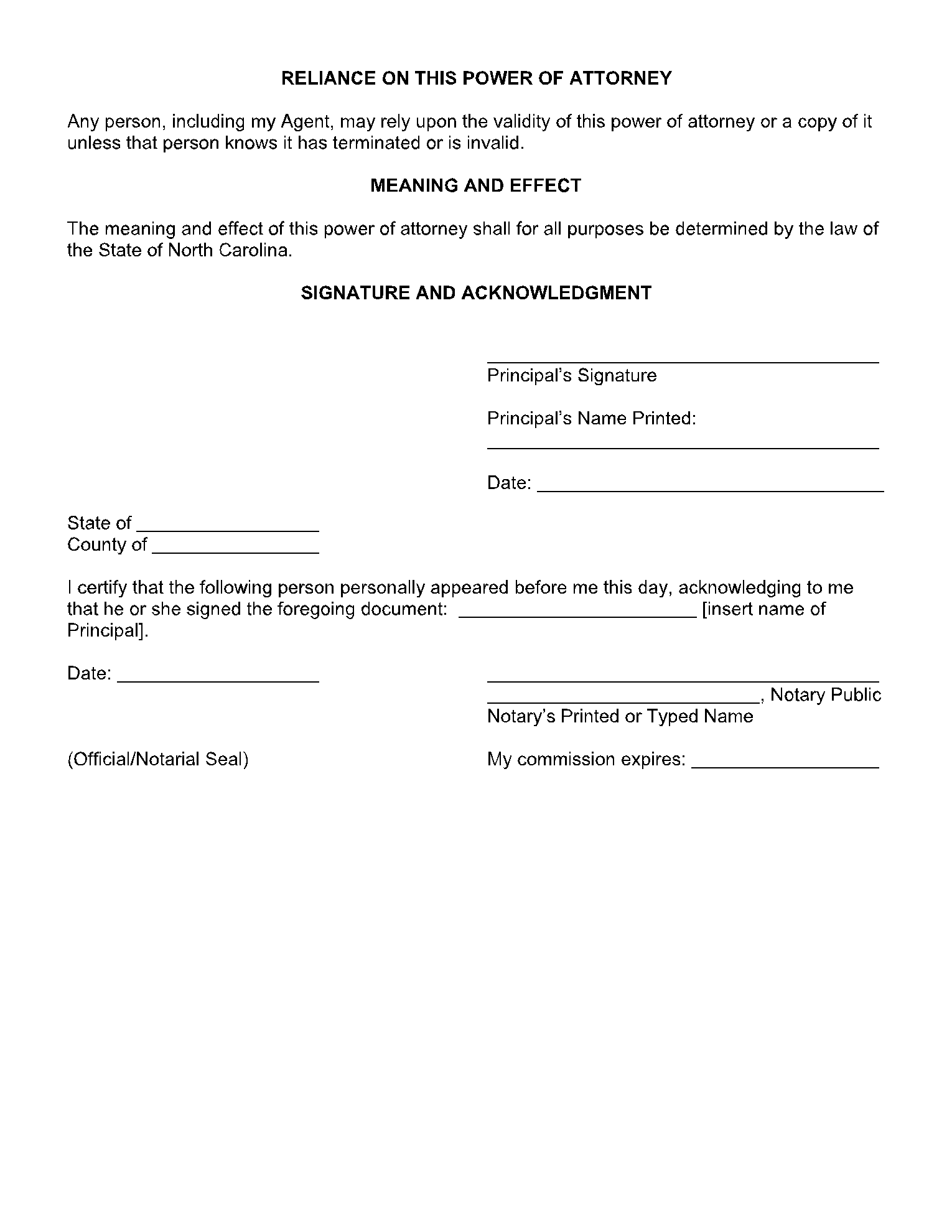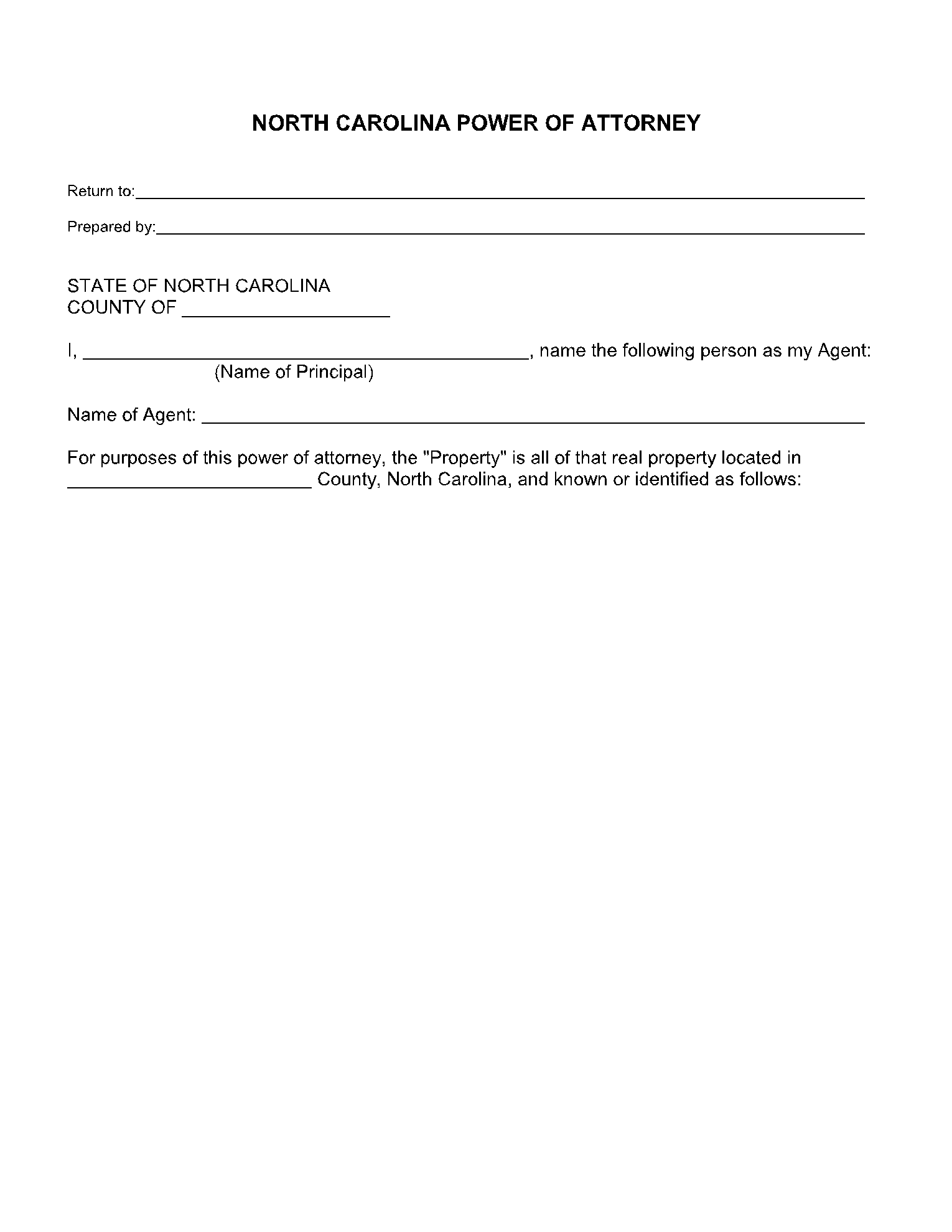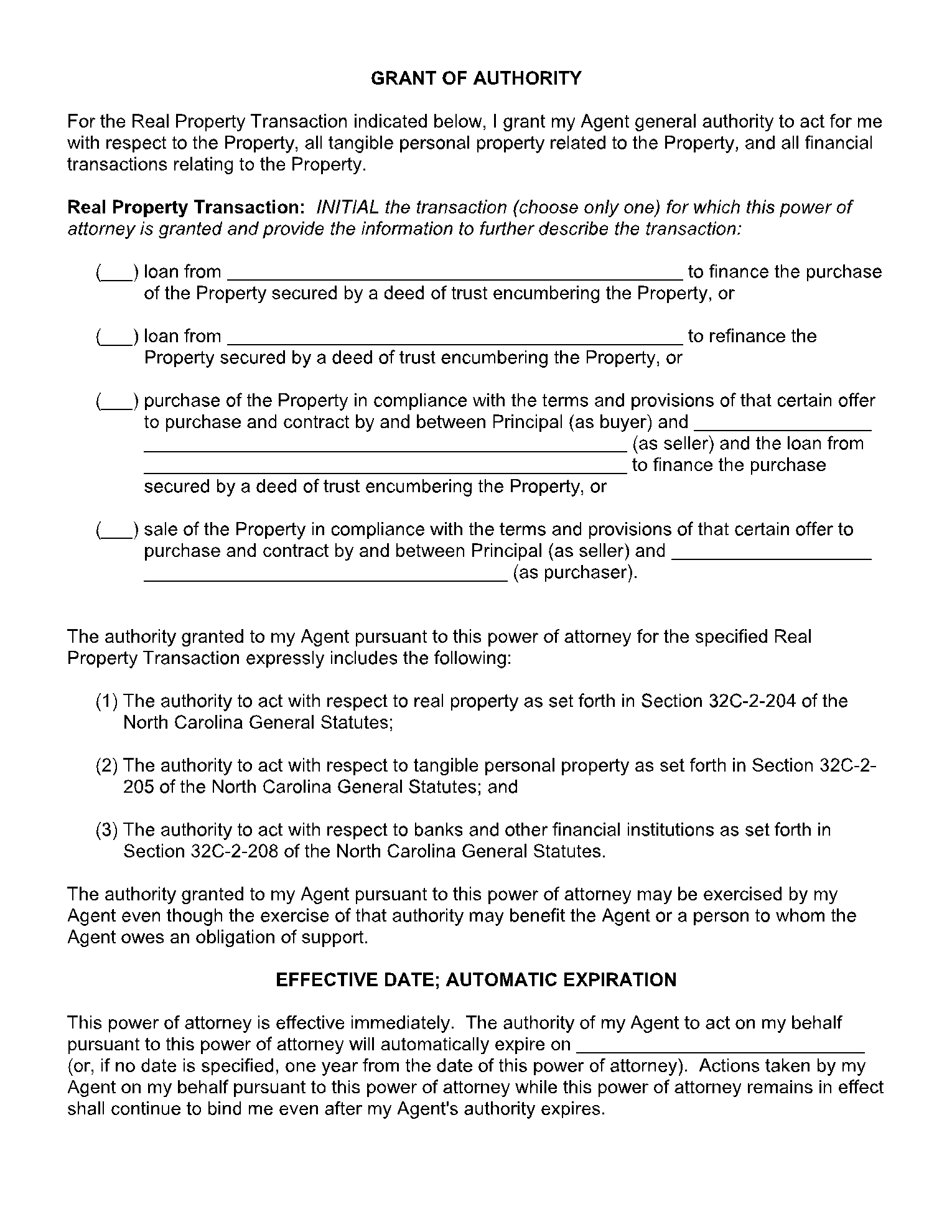A power of attorney is a legal document that helps delegate your responsibilities and legal rights to another individual. You might want to use a power of attorney for various reasons where you cannot physically present yourself for certain legal or financial transactions.
North Carolina has its own set of regulations and rules regarding the power of attorney forms. Without a valid NC power of attorney form, your agent will not be able to represent you to the third party institution or government agencies.
This article gives a brief overview of the power of attorney forms, their types, and how to get them in North Carolina.
What’s included in a power of attorney of North Carolina:
-
- Type of power of attorney
- Full executor details
- Full agent details
- Purpose
- Full property details
- Date of execution Notarized
What is North Carolina Power of Attorney?
A power of attorney form NC provides legal means to appoint yourself a proxy. The proxy here is usually referred to as the agent, and the individual conferring the rights is called the principal.
Why Would You Use a North Carolina Power of Attorney Form?
A North Carolina power of attorney form can be used for a multitude of purposes. Here is a list of reasons you may want to use a power of attorney form.
- To authorize tax professionals to represent a taxpayer and deal with confidential tax information.
- To appoint a legal guardian for a minor child in the absence of parents.
- To delegate health-related decisions in case of a medical emergency for an incapacitated principal
- To take legal or finance-related decisions for physically or mentally disabled principals.
- To give rights to real estate agents to carry out property dealings on behalf of the principal.
Power of attorney can also be used to help carry out any specific task for a limited time when the principals are not in a position to do so on their own. For instance, the principal could be overseas, traveling, or could be incarcerated, with limited options to fulfill certain legal or financial responsibilities.
Most of the third-party organizations and government agencies would require the principal to produce a valid power of attorney document. Such documents are also necessary for an agent to collect confidential information, which otherwise will only be shared with the principal.
What Are The Power of Attorney Requirements in North Carolina?
The state of North Carolina follows the regulations specified in the North Carolina Power of Attorney Act to stipulate the validity of the power of attorney forms. The requirements mandate for a valid document are:
- The principal(s) should be of sound mind when signing the document.
- The document should be signed in front of a notary public.
- The power of attorney document should contain the date of signature. If not, the document goes into effect when all parties involved have signed the document.
Types of Power of Attorney in North Carolina
Based on the purpose and duration of the validity of the power of attorney document, it can be classified into different types. You will have to select the right type that suits your purpose.
Durable Power Of Attorney
A durable power of attorney NC extends automatically in case the principal becomes mentally or physically disabled or incapacitated. A non-durable power of attorney will cease to be valid when the principal is incapacitated.
In North Carolina, all power of attorney documents are, by default, considered to be durable. If you wish to use a non-durable power of attorney, you will have to mention the terms in the Power of attorney document explicitly.
Medical Power Of Attorney
When an ill person is unable to make decisions regarding his/her health and medical treatments, the medical power of attorney NC gives his/her agent the power to make decisions on the principal’s behalf. Doctors and caregivers may use this document to get legal guidance on how to treat mentally disabled or unconscious patients.
DMV Power Of Attorney
This power of attorney gives your agent the right to deal with any activities related to the management of your motor vehicles.
General Power Of Attorney
This type of attorney is used to give the agent a broad range of rights and responsibilities to take care of the principal's legal and financial affairs.
Financial Power Of Attorney
This type of power of attorney is used specifically for finance-related activities. The agent is given the power to make financial decisions like withdrawing money from the principal's bank accounts, making investments, and so on.
Power Of Attorney For Care Of Minor Child
This type of power of attorney is used to appoint a legal guardian for the principal's children who are of age below 18. This can be used by the parents to shift parental responsibility temporarily to a trusted third party for matters related to medical care.
Tax Power Of Attorney
This type of power of attorney is used to appoint a tax professional to carry out your tax affairs. Unlike other POA documents, the signatures within need not be acknowledged by a notary public. The signatures of both the principal and the representative are required to put a power of attorney into effect.
Real Estate Power Of Attorney
Allows the agent to take care of property dealings like price negotiations, selling, and closing a deal on behalf of the property owner (principal).
How to Get A Power of Attorney in North Carolina?
North Carolina does not provide a strict template for the power of attorney forms. You will have to follow the power of attorney act and draft a form that conforms to the regulations of the act.
Sometimes, based on type and purpose, you will have to use specific forms types like the Form MVR-63 used for DMV power of attorney and the Form Gen 58 for the Tax power of attorney.
For a valid power of attorney, you will have to download the right form templates, fill it up and get it signed by the relevant parties. The notary public should also acknowledge the signatures. The document can then be used as proof by the agent to carry out the responsibilities.
Downloading the right form that fits your purpose is necessary to avoid any legal complications in the future. The NC power of attorney forms must specify date, signatures, duration of validity, date of commencement and end, and all other relevant details to be considered valid.
You need to make sure that there are no mistakes or the terms mentioned are valid and suit your requirements. Cocosign has a huge repository of all types of POA forms compliant with the North Carolina laws. Download the right type of form and fill out the information carefully.


